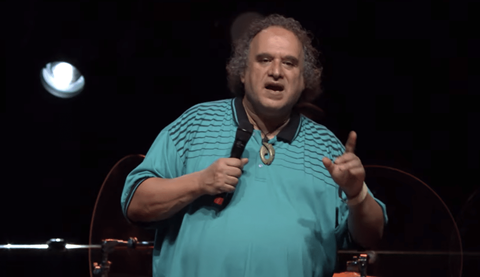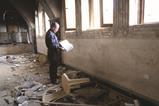Soul Survivor founder Mike Pilavachi manipulated, controlled, and mistreated young people under his spiritual care, a new independent report has stated. Fiona Scolding’s report confirms the findings of previous investigations. It also contains many potential lessons for the wider Church, reports Heather Tomlinson

An independent review into the Mike Pilavachi scandal has concluded the “cult of the charismatic leader” and a lack of effective oversight of Soul Survivor contributed to “extremely hurtful” events including “inappropriately intense relationships with young men” as well as unwanted physical “massages” and “wrestling”.
It also blamed an assumption that evangelical leaders would be heterosexual on a failure to guard against “impropriety towards young men,” although it did not comment on Pilavachi’s own sexual orientation.
Separately to the Soul Survivor founder’s own behaviour with young people, the report said he had also failed to act properly on disclosures of other abusive people while in ministry: including a failure to report Matt Redman’s abuse by a step-father to the authorities and an inadequate response to a counsellor named ‘XY’ who was alleged to have asked a counselee to take their clothes off. Pilavachi was also accused of inappropriate ‘altar calls’ at Soul Survivor festivals where, for example, he announced someone had a received a word from God that a young person in the congregation had been sexually abused by a parent, and then invited that person to come to the front to receive prayer.
The review, which was led by Fiona Scolding KC, a lawyer who has led a number of other safeguarding investigations within churches, also disclosed that Pilavachi was unhappy with the way that previous investigations by the Church of England were carried out. However the review agreed with the conclusions of the National Safeguarding Team (NST) and the Diocese of St Albans that a range of abusive behaviour had been allowed to happen within the church and festival that Pilavachi had led from its beginnings in 1993 until 2019, particularly spiritually abusive behaviour and inappropriate “wrestling” and “massages”.
“Hiding in plain sight, was someone who manipulated and controlled others, bullied and sought to abuse his power over those whom he worked alongside in the church and those who came to learn alongside him,” declared the report, though it also said he had been described as kind, generous, and gifted. “That abuse of power has caused deep psychological harm to many with whom he worked closely over 30 years. “Mr Pilavachi’s behaviours around young men and young women who came to learn and work alongside him were inappropriate and should never have been allowed to happen.”
Soul Survivor Watford apologised to those affected and said it was accepting the report’s conclusions in full. “We are fully committed to the ongoing process of changing the culture, restoring trust and bringing healing,” it said in a statement.
Soul Survivor Watford declined Premier’s request to interview a church representative about the report.
What went wrong
The review sought to explore how factors such as the culture of the Church of England and the charismatic evangelical movement contributed to the situation, with the view to making recommendations to prevent them in future. These included informal relationships with staff, perceiving leaders as ‘anointed’ and the celebrity attached to them, a lack of hierarchy, unclear accountability structures, and leaders who have not gone through the ordination process.
The Scolding report blamed aspects of Christian culture as well as regulatory failings for the scandal. “Various other matters are likely to have contributed to Mr Pilavachi’s behaviour and the failure to stop it,” it concludes. “These include (but are not limited to) the notion of spiritual celebrity and the anointed leader, the blurring of boundaries within the Soul Survivor organisations, inadequate performance management and oversight from the trustees and the Church of England, and a failure to take action when matters became known.”
The fact that Soul Survivor had grown so rapidly, drawing as many as 35,000 young people to the festival at its peak, at a time when church attendance and Christian belief was in decline, may have affected the judgement of those in authority. “Overarching all this is the view we have taken that, when an organisation is seen as successful, people do not look carefully enough about what the price may be for such success,” the report stated.
Coercion and wrestling
There are two main kinds of abusive behaviour outlined in the report and in the previous internal investigation. The first is coercive and controlling behaviour, including “ghosting” young men who Pilavachi had been in “inappropriately close relationships” with – a term that means suddenly stopping contact without explanation. The report said this was “extremely hurtful for the individuals concerned; it was controlling, manipulative and has led to long term psychological damage for some. The sudden ostracization that people experienced was confusing to them, and often led them to alter their behaviour towards Mr Pilavachi (in particular to not criticise him or act contrary to what they perceived his expectations to be) in order to avoid it occurring again.”
Pilavachi also raised expectations in some young people of roles in the organisation that never materialised, “almost as if their usefulness had expired.”
The other kind of behaviour of concern was physical one-on-one “wrestling” with young men and “massages”, sometimes half-naked and on his bed, which they felt unable to refuse, and were perceived as sexual by two of the victims, though views differed. “These massages were not sought out by the young people, they were not enjoyed, and many young people felt deeply ashamed after them,” the report says.
Abuse of power
The report concluded that whatever the motivation, for a spiritual leader they were an “abuse of power.” “Mr Pilavachi says that his behaviour was not sexual in intent – but the very circumstances described above would be widely seen in society as a precursor to sexual intimacy, if not sexually intimate in and of itself,” the report concluded. “Whatever the reasons for this behaviour, it was deeply inappropriate for a man who was in a position of responsibility over these young people and who held roles of spiritual power.”
The report emphasised the harm done to the individuals involved, the Soul Survivor community and the wider Church. “We have heard accounts from numerous people who are still struggling to come to terms with the effects of Mr Pilavachi’s behaviour towards them,” the report said. “Many have had to seek professional counselling. Some have had their lives uprooted. Mr Pilavachi undoubtedly bears primary responsibility for his behaviour and its effects.
“The impact of bullying and abuses of power on some of those to whom we spoke has been insidious and long lasting – it has impacted all aspects of their lives and some bear deep scars.”
The review also disclosed that Pilavachi himself – who has not commented publicly since the allegations came to light – has not been happy with the process. “Mr Pilavachi’s view was that the Church of England’s attitude to the allegations against him changed markedly from the point at which they reached the public domain and the press,” the report revealed. “He felt that the NST and Diocese’s investigation had not been conducted with a sufficiently open mind and that the NST’s questioning of him had been hostile and aggressive. This had discouraged him from further interviews and had not enabled him to give a fair account of his conduct. Mr Pilavachi has also never seen the full report on his conduct, only the press release. Mr Pilavachi has suggested that some of the allegations against him were not safeguarding matters and so did not fall within a safeguarding remit.”
Lessons to learn
Some of the analysis and recommendations for churches and Christian organisations taken from the report were as follows:
- “People give celebrities licence to behave differently (although they should not) and are naturally in awe of them. This would have played into many people’s view of Mr Pilavachi and the way that he acted and behaved. Charismatic worship, particularly at the Festivals, was and is a professional production – involving professional sound, lights and production management. It is theatrical. Young people are impressionable and Mr Pilavachi’s presence on that stage would have formed a large impression on them. That should have been understood and steps taken to recognise this.”
- “People assumed that a person in his position could not be gay and so there could not be any suggestion or risk of impropriety towards young men (as opposed to women). As a result, nobody thought it necessary to ensure that Mr Pilavachi or the young men around him were protected from the suggestion of (or the fact of) sexual impropriety – again though we stress that we make no conclusions about Mr Pilavachi’s sexuality… Christian leaders must be prepared to have honest and difficult conversations with trustees and others to whom they are accountable about their sexuality and must be prepared to be (and indeed expect to be) challenged as to this. Naive assumptions should be eschewed: clearly Evangelical Christians can be gay, lesbian or bisexual and this might be so even where they are married to a person of the opposite sex.”
- “Christian leaders, and particularly those of high-profile, successful churches, need to take great care that they do not unrealistically raise people’s hopes and expectations with careless words and promises. Leaders who claim or are thought to have prophetic gifts need to take even more care.”
- “What is clear is that the culture of the Church needs to change: it needs to become open to hearing a plurality of views. It needs to become collaborative in its decision making. It needs to be more democratic in nature.”
- “In our view this case shows that great caution should be taken before ordaining individuals who have not undertaken the entire selection and training process. We recognise that there are always exceptions – those who intend to teach at a theological college or teach theology, or those who will not be running a church organisation – but those who will be carrying out the role of day to day ordained ministry should, in our view, be required to complete the entire course.”
- “There needs to be a culture within the church of being able to speak up, of being able to blow the whistle. There also needs to be a mechanism whereby concerns are dealt with quickly and appropriately. Having whistleblowing and speaking up policies is the basic requirement, but much more than this is needed to create a space where people feel able to discuss difficult matters and to discuss them constructively.”
- “What may (and we stress may – this is a hypothesis and not a concluded view) be the case is that Evangelical and Charismatic churches are currently growing at a faster rate than other sorts of church practice, and they often attract large numbers of people. The larger the numbers, the greater the power and the greater need to check oneself and reflect upon the opportunities to abuse power. An emphasis on the physical manifestation of spiritual gifts (particularly in the Charismatic church) may also give those who are perceived as being particularly gifted more personal power. Furthermore, the Evangelical emphasis on the absolute authority of scripture could lead such churches to eschew church authority structures – or at least treat them with scepticism. This can lead to a lack of accountability. We should stress that we are not saying that there is anything inherently wrong with these movements or traditions, merely that those involved in them should be self-conscious and aware of potential blind spots.”
- “We consider that external representation on the board of trustees of the Church should have been a requirement of the [Bishop Mission Order] and should have been implemented since the commencement of the various trusts to ensure adequate accountability.”
- “The role of the trustees and accountability structures within the organisation were not well articulated to the broader church. Many people were not clear who the trustees were, or the role that they played, and were not aware that they could see them with complaints or concerns.”
- “We consider that those ties of friendship and kinship made it more difficult to challenge Mr Pilavachi, and also easier for professional boundaries to become blurred. We are not saying that such employment should not take place, but it does require a degree of thought and self-reflection as to how to navigate interpersonal relationships. The strong bonds of affection also meant that if the employment did not work there would be a feeling of betrayal and emotional hurt which may not be present in other organisations and situations. The strong feeling of hurt and pain expressed by many who had worked with Mr Pilavachi is testament to the difficulties that can be created.”
For more on this story listen to Premier Christianity’s ‘Soul Survivors’ podcast
Fiona Scolding’s full report can be accessed here






































No comments yet